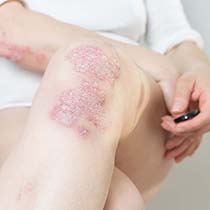
Consuming natural sugar in the form of carbohydrates from fruits, vegetables, and grains supplies energy to our cells since these foods are digested slowly. These foods reduce our risk of many chronic diseases. Health problems occur, however, when we add too much sugar to our diet. Many studies support a link between a high sugar ‘western diet’ and diabetes, obesity, coronary artery disease, stroke, and cancer. High sugar intake may lead to the development of inflammation.
A recent study in the Journal of Investigative Dermatology showed that genetically predisposed mice fed a high sugar diet developed psoriasis and psoriatic arthritis. Changes in gut bacterial composition, specifically, less diversity compared to mice fed a normal diet, were also noted – supporting a potential link between diet and psoriatic inflammation. The mice did not become obese during the short duration of the study, suggesting that the diet impact can occur independent of obesity. When the mice were switched back to a conventional diet, their skin and joint conditions improved, along with increased diversity of their gut bacteria.
These findings offer a basis for studies in humans; diet, probiotic therapy, and selective use of antibiotics to optimize gut bacterial composition. The author comments that dietary changes may not replace the need for other psoriasis treatments but shifting to a low sugar diet is likely to make treatment more effective.


